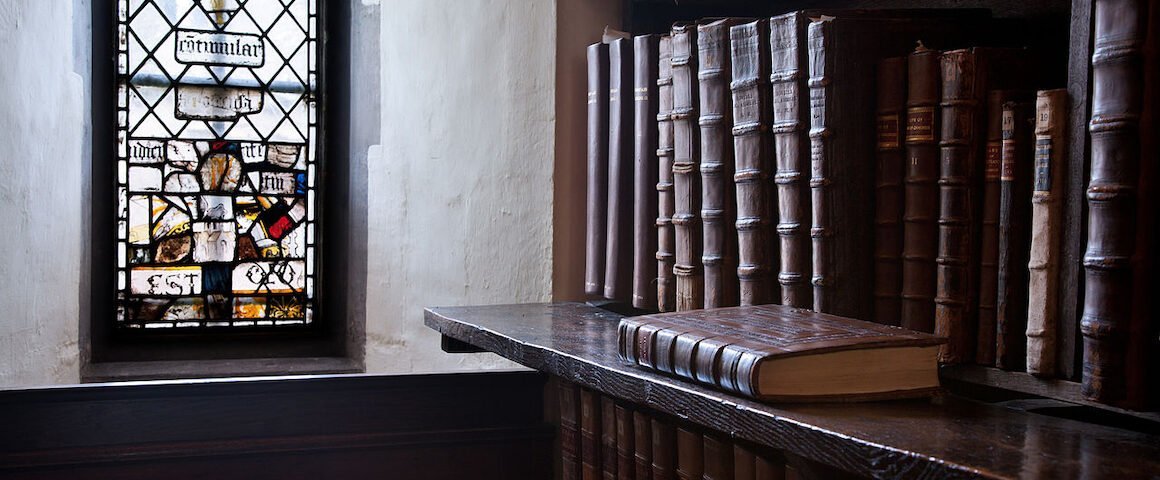The declaration contained in Article XX—that “the Church hath power to decree rites or ceremonies, and authority in controversies of faith; and yet it is not lawful for the Church to ordain anything that is contrary to God’s word written”—has been much attacked by Puritans both old and new. As Browne observes, “The origin of the dispute about the first clause in this Article was the repugnance of the Puritan divines to the use of the surplice and other Church ordinances.” In particular, the principle that church rites and ceremonies may be adopted so long as they are not contrary to Scripture—often termed the “normative principle” of worship[1]—was deemed insufficient: “The Puritans contended, not only that the Church could not enact new articles of faith, but that no rites or ceremonies were admissible but those for which there was plain warrant in the new Testament.”
The belief that, in the words of the Westminster Confession, God “may not be worshipped…under any visible representations or any other way not prescribed in the Holy Scripture”[2] is commonly known today as the “regulative principle” of worship. The question of how to judge church rites and ceremonies was, for a time, one of the primary theological flash points between Puritans and the established Church of England, as multiple historical accounts attest.[3] Even today many Protestants uphold the regulative principle using language comparable to the Westminster Confession, with reference to “the specific commands of Scripture” as authorizing proper worship.[4] In addition to this and other confessions such as the Heidelberg Catechism,[5] contemporary advocates of the regulative principle often cite a particular passage of Calvin from The Necessity of Reforming the Church in which he says, “I know how difficult it is to persuade the world that God disapproves of all modes of worship not expressly sanctioned by His Word.”[6]
However, Calvin also comments on the subject in his Institutes, where he suggests there is more latitude in worship practices than the “specific commands” understanding of the regulative principle allows for:
As in external discipline and ceremonies, [God] has not been pleased to prescribe every particular that we ought to observe (he foresaw that this depended on the nature of the times, and that one form would not suit all ages), in them we must have recourse to the general rules which he has given, employing them to test whatever the necessity of the Church may require to be enjoined for order and decency. Lastly, as he has not delivered any express command, because things of this nature are not necessary to salvation, and, for the edification of the Church, should be accommodated to the varying circumstances of each age and nation, it will be proper, as the interest of the Church may require, to change and abrogate the old, as well as to introduce new forms.[7]
These two statements may seem to be at odds, but they can be reconciled—to say worship practices must be “expressly sanctioned” by the Bible is different than saying this sanction must take the form of a specific command. In fact, such sanction could be expressed in “general rules,” to use Calvin’s phrase. This reading is further supported by the fact that with regard to worship practices, Calvin also says in the Institutes that “I approve of those human constitutions only which are founded on the authority of God, and derived from Scripture, and are therefore altogether divine.”[8] For a worship practice simply to be “derived from Scripture” is very different from its being based on a specific command, as the former standard allows for a wider range of acceptable practices. If some think it implausible that the phrase “expressly sanctioned” be understood to mean something broader than specific commands, it could also be observed that the final edition of the Institutes was published several years after The Necessity of Reforming the Church, making the former a reflection of Calvin’s more mature thought.
Whatever the case, the attitude to worship practices expressed by Calvin in the final edition of his Institutes aligns with what Michael Farley calls a “theologically-oriented RP.” This sort of approach to worship practices “[expands] the category of warrant to include general theological principles and biblical patterns embodied in liturgical practices.”[9] This broader understanding of the regulative principle contrasts with the more narrow account of it described above, designated by Farley as a “practice-oriented RP.” Such an approach “seeks biblical warrant by looking for biblical references to particular practices.”[10] Farley identifies a number of weaknesses with a practice-oriented regulative principle, such as the fact that it “[reads] the New Testament (NT) in an inappropriately narrow and legalistic fashion. The NT was not written to be a complete manual of liturgics.”[11] Moreover, this kind of approach “functionally excludes most of the Old Testament (OT) in its method of theologizing about worship”:
While proponents of the Puritan, praxis-oriented RPW have often cited OT warnings against deviating from God’s commands in order to establish this hermeneutical norm itself, they also frequently argue that features of worship in the OT such as the use of musical instruments, visual symbols, a liturgical calendar, or ministerial vestments, are no longer permissible for Christian worship simply because they are not explicitly commanded in the NT. This is an unusual exception to Reformed hermeneutics, which typically emphasizes covenantal continuity in every other area of theology such as systematics, polity, and ethics. Moreover, the Reformed confessions apply theological principles from the OT practices of circumcision and Passover to Christian sacramental theology, and thus it seems oddly inconsistent to prohibit applications derived from other dimensions of the OT liturgical system.[12]
Finally, many Continental Reformed churches prior to the Puritans did not adopt a practice-oriented regulative principle, as Farley observes: “The first generations of Reformed churches justified practices in worship by appealing to more general biblical principles beyond explicit biblical commands. Furthermore, early Reformed churches widely employed practices that later Puritans and their liturgical successors prohibited as violations of their concept of the RPW, such as ministerial robes, written prayers, and a church calendar.”[13] Indeed, the celebration of Christian holidays by churches is approved (though not required) by the Second Helvetic Confession: “If in Christian liberty the churches religiously celebrate the memory of the Lord’s nativity, circumcision, passion, resurrection, and of his ascension into heaven, and the sending of the Holy Spirit upon his disciples, we approve of it highly.”[14]
We find, then, that in practice a theologically-oriented regulative principle looks a lot like the normative principle. In both approaches, Scripture is the final authority on what worship practices are acceptable, yet the range of acceptable practice is not confined to specific commands. Hence both Anglican and Presbyterian churches today can be found that celebrate Christian holidays, use liturgical vestments, and incorporate musical instruments in worship. Would that stricter Presbyterians and other contemporary adherents of a practice-oriented regulative principle followed the example of the older Continental Reformed churches rather than the innovations of the Puritans.
Notes
- Confessional Lutheranism also upholds the normative principle, as can be seen in the Augsburg Confession: “Of Usages in the Church they teach that those ought to be observed which may be observed without sin, and which are profitable unto tranquillity and good order in the Church, as particular holy days, festivals, and the like.” Book of Concord, “The Augsburg Confession,” Article XV, par. 1, https://bookofconcord.org/augsburg-confession/of-ecclesiastical-usages/. ↑
- “Westminster Confession,” ch. XXI, sec. I, https://thewestminsterstandard.org/the-westminster-confession/#Chapter%20XXI. ↑
- See, e.g., Michael R. Watts, The Dissenters, vol. 1: From the Reformation to the French Revolution (Oxford: Clarendon Press, 1978), 305‒312; Michael P. Winship, Hot Protestants: A History of Puritanism in England and America (New Haven, CT: Yale University Press, 2018), 13‒14; and David D. Hall, The Puritans: A Transatlantic History (Princeton, NJ: Princeton University Press, 2019), 41‒75, 89‒92, 186‒96. ↑
- Nathan W. Bingham and John Tweeddale, “What Is the Regulative Principle of Worship?” Ligonier, 26 January 2023, https://www.ligonier.org/podcasts/ask-ligonier/what-is-the-regulative-principle-of-worship. Compare D. G. Hart, Recovering Mother Kirk: The Case for Liturgy in the Reformed Tradition (Grand Rapids: Baker Academic, 2003), 71; “The Regulative Principle,” Ligonier, 18 September 2012, https://www.ligonier.org/learn/devotionals/the-regulative-principle; Daniel R. Hyde, “What Is the Regulative Principle of Worship?” Ligonier, 11 January 2017, https://www.ligonier.org/learn/articles/what-regulative-principle-worship; Ligon Duncan, “What Is the Regulative Principle of Worship?” Reformed Theological Seminary, 7 February 2018, https://rts.edu/resources/what-is-the-regulative-principle-of-worship/; and Derek Thomas, “The Regulative Principle of Worship,” Ligonier, 12 November 2021, https://www.ligonier.org/learn/articles/regulative-principle-worship. ↑
- See “The Heidelberg Catechism,” Q. 96, https://rcus.org/confessions-2/. ↑
- John Calvin, The Necessity of Reforming the Church, trans. Henry Beveridge (Philadelphia: Presbyterian Board of Publication, 1843), 17. ↑
- John Calvin, Institutes of the Christian Religion IV.10.30, trans. Henry Beveridge (Peabody, MA: Hendrickson Publishers, 2008), 797. ↑
- Calvin, Institutes IV.10.30, 797. ↑
- Michael Farley, “The Regulative Principle and Biblical Worship: Three Reformed Approaches,” Modern Reformation, 22 November 2021, https://www.modernreformation.org/resources/articles/the-regulative-principle-and-biblical-worship-three-reformed-approaches. ↑
- Farley, “The Regulative Principle and Biblical Worship: Three Reformed Approaches,” https://www.modernreformation.org/resources/articles/the-regulative-principle-and-biblical-worship-three-reformed-approaches. ↑
- Michael Farley, “The Regulative Principle and Biblical Worship: A Case for a Biblical-Typological Approach,” Modern Reformation, 23 February 2022, https://www.modernreformation.org/resources/articles/the-regulative-principle-and-biblical-worship-a-case-for-a-biblical-typological-approach-2. ↑
- Farley, “The Regulative Principle and Biblical Worship: A Case for a Biblical-Typological Approach,” https://www.modernreformation.org/resources/articles/the-regulative-principle-and-biblical-worship-a-case-for-a-biblical-typological-approach-2. ↑
- Farley, “The Regulative Principle and Biblical Worship: A Case for a Biblical-Typological Approach,” https://www.modernreformation.org/resources/articles/the-regulative-principle-and-biblical-worship-a-case-for-a-biblical-typological-approach-2. ↑
- “Second Helvetic Confession,” ch. XXIV, par. 4, https://www.ccel.org/creeds/helvetic.htm. ↑







'On the Regulative Principle [Commentary on Browne: Article XX]' has no comments
Be the first to comment this post!